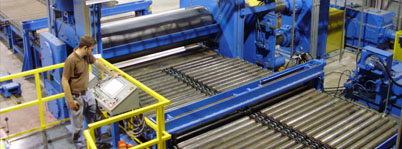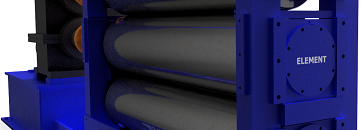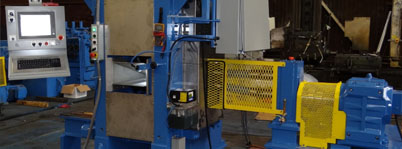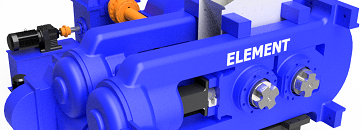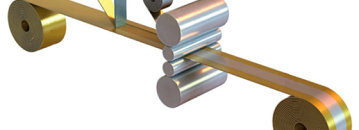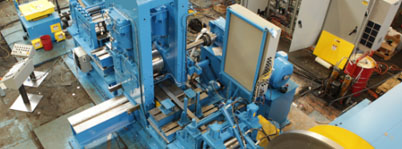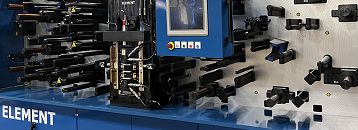Rolling mill consisting of four rolls or known as a 4 High rolling mill is used for reducing material to extremely small thicknesses. Through the use of larger backup rolls, the issues of roll deflection can be avoided and smaller work rolls can be used. This reduction in work roll diameter:
- Reduces overall separating force required for reductions
- Reduces overall energy needed for reducing material
- Produces more consistent thickness output
4 HIGH ROLLING MILL EQUIPMENT OPTIONS
With any Element Rolling mills, we offer several options that are available to increase the productivity of your equipment. Some of the options that we offer to maximize the capacity of our mills include:
- Quick roll change out options
- Repetitive reduction schedules
- Automatic gauge control features
Element mills offer a wide range of feed back options for roll positioning that provide tight output tolerances. Our most accurate design incorporates non contact positive roll detection that can provide output to tolerances of better than +/-0.0001″ (+/- 4um).
Rolling mill can have multiple different configurations that are used depending on material type, thickness and yield strengths. Element has built a wide variety of rolling mills to fit multiple applications.
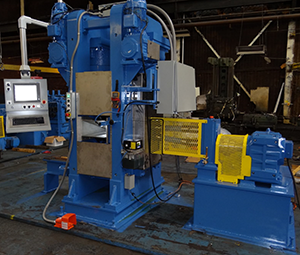
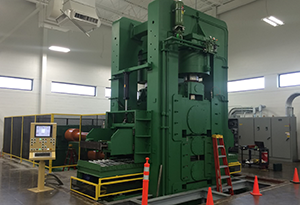
4 HIGH ROLLING MILL EXPERIENCE
Element has designed and built multiple 4 high rolling mills for a wide variety of applications from foil processing to individual piece rolling. These machines have ranged in separating forces from 100 UST (90 MT) to 1000 UST (907 MT), handle strip widths from 2″ (50.8 mm) to 120″ (3.048 m) and reduce strip thicknesses from 0.00025″ (0.0063 m) to 2″ (50.8mm). These 4 high rolling mills have utilized hydraulic, pneumatic or electromechanically actuators. Our mills can be supplied as standalone equipment for individual piece reductions or as part of our total line of equipment with coil processing material handling equipment.
MINIMUM |
MAXIMUM |
|
|---|---|---|
| Material Thickness | 0.00025″ (0.0063 mm) | 12″ (305 mm) |
| Material Width | 1″ (25.4 mm) | 144″ (3,658 mm) |
| Coil Weight | 500 lbs (228 kg) | 100,000 lbs (45,359 kg) |
| Separating Force | 50 UST (45 MT) | 3,000 UST (2,722 MT) |
| Line Speed | 50 FPM (15 MPM) | 3,000 FPM (914 MPM) |
| Thickness Tolerance | +/- 0.0001″ (0.0025 mm) | +/- 0.002″ (0.051 mm) |
Element Rolling Mills meet a wide variety of multiple applications used in different industries and are built with the following options:
CONTROL OPTIONS |
WORK PIECE TYPES |
INDUSTRIES SERVED |
|---|---|---|
|
|
|
TOLERANCES |
MATERIALS |
|---|---|
| Typically rolling mills have very accurate positioning to ensure outgoing material gauge meets a required dimensional tolerance. Typical industry standards that can be used to establish these tolerance include: | Rolling mill systems can be used to reduce a variety of materials. Element Machinery has built mills to reduce a wide variety of incoming material including cladded materials. Some typical materials include:
|
WHAT WE OFFER
2 High Rolling Mill
Rolling mills consisting of two rolls are known as a 2 High Rolling Mills and are used for anything from temper pass to breakdown of the material.
3 High Rolling Mill
A 3 High Rolling Mill consists of three rolls and is typically used for either performing multiple reduction passes by wrapping material around the center mill roll, or for bonding of dissimilar stacked material passed through the mill. Three High Rolling Mills can also be used for flattening of expanded metal sheets.
4 High Rolling Mill
A four roll configuration is known as a 4 High Rolling Mill, whereby the work rolls are generally smaller in diameter supported by larger backup rollers. These mill can be used for tighter tolerance output material, and for reducing material to extremely small thicknesses.
Compacting Rolling Mill
Compacting rolling mills are used for converting powder or powder like material into continuous strip.
Cladding Rolling Mill
Cladding rolling mills are used to combine two dissimilar materials into a single strip through compression.
Casting Rolling Mill
Casting rolling mills are used for continuous roll casting of strip. Casting rolling mills are typically 2 or 4 high hot mills capable of providing consistent thickness strip from hot cast incoming material.
Embossing Rolling Mill
Specialized rolling mills that emboss a pattern or indent into metal strip are known as embossing mills. These patterns can be used for decoration, to help with structural qualities of tubing or simply to increase material length without significantly decreasing the material thickness for cost savings.
Lithium Metal Processing
We supply a broad range of machinery and services to help in your lithium metal processing application.
HOW CAN WE HELP YOU?
Give us a call (855) 447-7648 or send us a message here.


